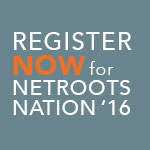After a great run, the Winning the Internet blog has been retired. However, you can still keep in touch with New Media Mentors here.
Over the years New Media Mentors has had the opportunity to mentor a diverse set of organizations that aspire to take their new media work to the next level. I’ve worked with groups to mobilize more supporters, grow their support base, design powerful email programs, develop strategic new media plans, identify new tools, make social media work more effective, experiment with new types of advertising, develop rapid response programs, identify meaningful ways to measure the progress and impact of new media work, and more. Based on that experience we’ve put together “How to Win the Internet” which can be used as a framework for setting nonprofit organizations up for success online.
We’ve broken the framework down into four key building blocks: leadership, knowledge, collaboration and budget. We’ve found that when these blocks are in place, groups work more effectively, reach more people in more communities and ultimately have a greater impact.
How to Win the Internet
![]() Leadership
Leadership
First and foremost, we believe that leadership is a critical part of having success online. Organizations that have a clear direction and explicitly communicate that direction to staff tend to be more successful than organizations that are less focused. This means having a strategic plan and clear theory of change in place. It’s not unusual for organizations to be between plans, or put off doing this kind of planning, but the organizations that are most successful don’t shy away from it.
We also believe that leaders that embrace new media and integrate it into the culture of the organization have the most success. This flies in the face of the old model of treating new media work as low priority work that should be placed in a silo and relegated to the hands of an IT associate or intern. It means making new media a part of strategic planning, and empowering staff to take calculated risks online and report back to the staff, as part of a culture of learning.
![]() Knowledge
Knowledge
As the saying goes, knowledge is power! This is definitely true for new media. Online organizers that know how to use social action technologies and follow best practices run more successful campaigns. When organizations combine this knowledge with strategic planning, they’re able to get more impressive results out of the same amount of work because they’re working smarter and with more confidence. They can also take their work to an even higher level by using techniques like testing to objectively measure success and fine-tune their work.
![]() Collaboration
Collaboration
Collaboration is another key part of success online. This goes back to the earlier point about not pushing new media work into a silo. Organizations that are able to keep their new media work fresh, meaningful and relevant frequently involve offline staffers, like program staff, in the effort. They also work together across departments to make decisions about new media.
![]() Budget
Budget
Finally, we’d be remiss if we did not address budget. First of all, we’ve found that new media staffers need access to mass email, social action, and other online tools to work towards achieving the organization’s goals. The exact tools depend on the specific organization’s goals and what they’re trying to achieve online, but asking staff to operate without the appropriate tools doesn’t work.
Second of all, it’s important that the expectations placed on new media and other staffers are consistent with staff resources. This can be a tough one in a world where everyone’s short staffed! However, we’ve found that it just doesn’t work to expect a lone new media staff member to manage mass emails and social media accounts for ten different programs, for example. At least not without setting clear priorities and allowing some less important things drop by the wayside.
Each of these blocks is important on their own, and most organizations can improve their online work to some degree by tackling one or two of them. However, organizations that are strong in all four areas are best positioned for success online. Because of this, we’ve designed our mentorships to consider all of the building blocks together.




Comments are closed.